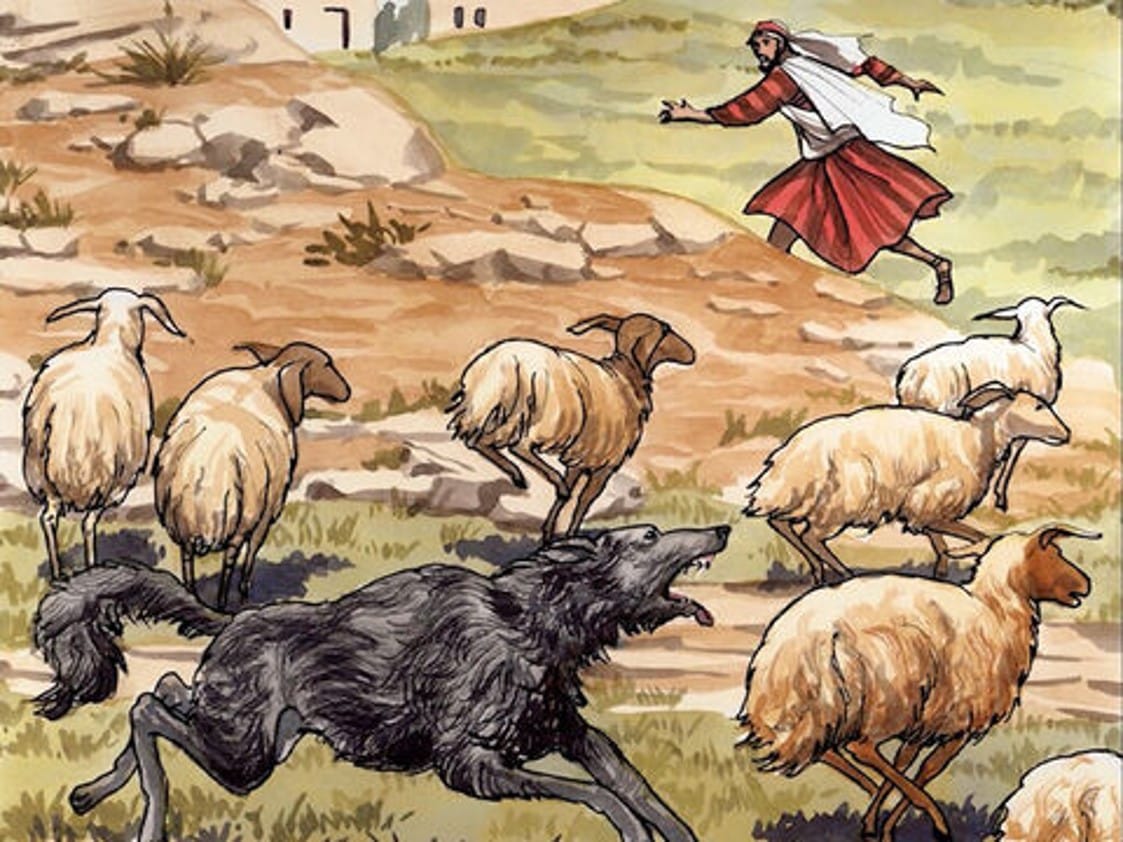Ezekiel’s prophecy to the shepherds of Israel spoke to me recently. (I’ll quote it at the end.)
The essence of the accusation is that the shepherds – the ones responsible for taking care of the people – were taking care of themselves at the expense of the people. They betrayed the people they were responsible to care for.
You might be familiar with the concept of a leader “fleecing the sheep.” That’s a bad thing. God sounds pretty serious when he talks about it here.
I’ve encountered “Christian ministries” whose “ministry” was mostly asking for donations. It’s pretty easy to see there’s a problem with that. I’ve thought, “I wouldn’t want to be in their shoes on Judgment Day,” and I stopped asking questions.
But this morning, I felt the Good Shepherd drawing my attention in a couple of new directions that I hadn’t considered before.
First, I realized that while *some* of these failing shepherds might know full well that what they’re doing is wrong, there are probably others who are doing the best they can, and still failing, still qualifying for inclusion in this judgment. So far, I see four categories.
• We’ve already considered the shepherds who are fully aware that they’re betraying their people.
• I have known leaders that had good intentions, but no actual skill at leading anyone. Bible School or Seminary doesn’t make you a competent leader of people.
• I have known leaders that had good intentions, had great skill at leading, but they had missed the memo that they were called to build God’s Kingdom, not their own. It’s too easy to get a business card printed these days.
• I have known leaders that had good intentions, great skill, and wanted to build God’s kingdom, but their moral compass had lost its bearings, and they fell into all sorts of temptations and corruption. So sad.
○ And, of course, there are a huge number of faithful shepherds, who put both the needs of the sheep and of the Good Shepherd ahead of their own, many times at great personal sacrifice. I’m really thankful for these men and women among us!
Outrage is a really popular, and really powerful thing these days, and frankly, it’s a worldly response to some of these failing shepherds. But for some of them, I wonder if pity might not be appropriate.
And since neither outrage nor pity fixes anything, maybe we should pray for these poor failing individuals. And especially for the sheep that they oversee. The Good Shepherd, it seems, is more about redemption than about punishment.
But he wasn’t done stretching me.
I’ve always thought about this passage in the context of church leaders; after all, we call them “shepherds” sometimes.
But then I realized that he’s talking about people who have a responsibility to take care of other people, and that is not just about church leaders. (That unbiblical and artificial “sacred/secular division” busted my chops again!)
I realized that God is concerned about “secular” leaders who betray their people, too.
• These days, it’s not too difficult to think of political leaders who betray the people who voted them into office. The number of leaders whose net worth increases by tens of millions of dollars while on a salary is indicative. And embarrassing. And those whose income grows the fastest seem to not stand up very well for the issues of the people they represent.
But then I realized that this betrayal might be a bigger issue than even self-enrichment. No wonder God is so frustrated about it.
• I thought about business leaders who put their own profits, the profits of their businesses ahead of the people that they are “serving” in their business. Names came to mind: Disney, Pfizer, Merck, Amazon, Enron, Weinstein, Epstein. There are others. I suspect that there are business leaders in all the same categories of failure as church leaders.
• Then it occurred to me that there has been a similar betrayal in our education system. Claudine Gay at Harvard made a lot of headlines in the past year or two, and higher education has, as a whole, been pretty active at disassembling the faith of their students. But there have been thousands of videos of teachers and school board meetings revealing an intentional effort to violently change the values, and occasionally the gender, of the students they “serve.”
• We’ve discussed the betrayal of the mainstream media enough over the past several months; so many of them have transformed from “presenters of news” to propaganda tools of both government and big business. Both news media organizations and news personalities.
So what do we do with all these shepherds who have failed us, who are still failing us?
Well, I begin by praying. If we fail in our prayers, nothing else matters. I’m still praying that the things that have been hidden in the darkness so long would be brought out into the light, and dealt with justly; I pray it for every aspect of our culture here: government, church leaders, business leaders, media, all of it. (I pray this for my own life as well, but that’s a different conversation.)
More and more, I’m finding my prayers including calling for repentance in the hearts of the leaders who have made a living betraying our trust, preying on those they are called to serve. God is no less interested in redemption in the 21st century than he was in the first century.
-----
The word of the LORD came to me: "Son of man, prophesy against the shepherds of Israel; prophesy and say to them: 'This is what the Sovereign LORD says: Woe to you shepherds of Israel who only take care of yourselves!
Should not shepherds take care of the flock? You eat the curds, clothe yourselves with the wool and slaughter the choice animals, but you do not take care of the flock. You have not strengthened the weak or healed the sick or bound up the injured. You have not brought back the strays or searched for the lost.
You have ruled them harshly and brutally. So they were scattered because there was no shepherd, and when they were scattered they became food for all the wild animals. My sheep wandered over all the mountains and on every high hill. They were scattered over the whole earth, and no one searched or looked for them.
"'Therefore, you shepherds, hear the word of the LORD: As surely as I live, declares the Sovereign LORD, because my flock lacks a shepherd and so has been plundered and has become food for all the wild animals, and because my shepherds did not search for my flock but cared for themselves rather than for my flock, therefore, you shepherds, hear the word of the LORD: This is what the Sovereign LORD says:
I am against the shepherds and will hold them accountable for my flock. I will remove them from tending the flock so that the shepherds can no longer feed themselves. I will rescue my flock from their mouths, and it will no longer be food for them.
[Ezekiel 34:1-10]




















